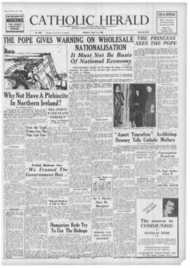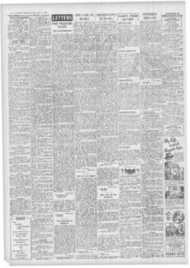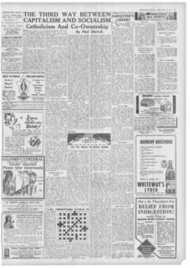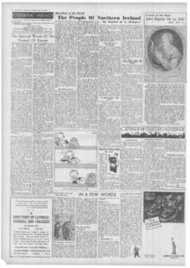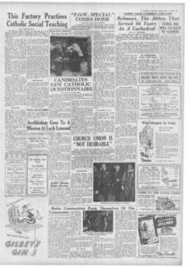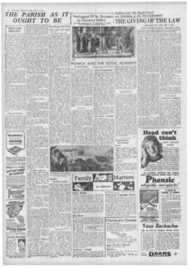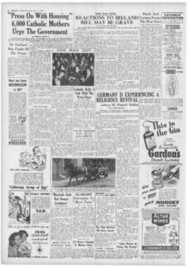Page 6, 13th May 1949
Page 6
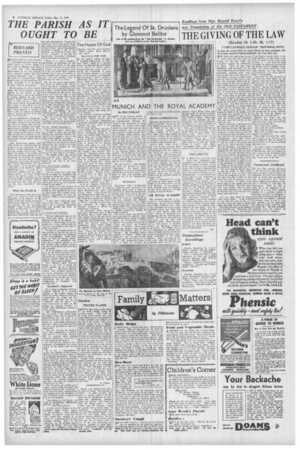
Report an error
Noticed an error on this page?If you've noticed an error in this article please click here to report it.
Tags
Share
Related articles
For Young People
The Parish Unit
The Functions Of A Parish
Parish Revival
Cells Make A Parish Live
THE PARISH AS IT OUGHT TO BE
by
BERNARD MENUS
REVOLUTION in a City Parish*
contradicts the main thesis of Abbe Godin in, France Pagan (see CATHOLIC HERALD issue May 6, 1949) that " the parochial organisation by its very essence lacks weapons against the surrounding paganism " and is not the means for winning back " the masses ready for the preaching of JeStIS crucified if it be given to them without accessories."
Of Revolution in a City Parish, which, like France Pagan ?, bears witness to the efforts of the Church in France, one of the priests at present engaged on our own General Mission said recently: " I carry it with me as a kind of vade mecum and for 18 months have been trying to get priests of my acquaintance to read it in French; now it has appeared in English I hope it will he read by all priests and not merely referred to by the more knowledgeable."
Lest the introduction should mislead, Revolution in a City Parish is not really a thesis on how the working classes in France shall be rescued from the indignity and emptiness of their proletarian lives. It is, rather, the unwilling record by a hard working parish priest of what, with the help of his assistant priests, he is doing about the pagan masses around him, and the reasons why he is doing it.
Abbe Michonneau begins, with Abbe Godin, by recognising that the parish is usually considered to be the three or fear thousand who practise their religion. more or less. He rejects this notion of the parish and insists that the forty thousand or so inhabitants of the parish, the pagan masses, are also the concern of the " missionary community. the parish." But whereas Abbe Godin sees the " first charge" of the parish as the " perfecting of its members," Abbe Michonneau says, " A parish in a missionary country must be a mis
sionary Parish. It cannot confine itseff to the spiritual needs of the Christian people. Naturally part of its activity will be meant specially for them—but only a part and that not the most important." (Our italics.) What the Parish Is
Abbe Michonneau then goes on to stress some points in favour of the reqpgnition of thy primacy of the parish in the fight against the pagan world which readers of THE CATHOLIC HERALD will find somewhat familiar. First, he pays, the parish is there, it does exist, it is a cell of Christianity, of the Incarnation. Parishes takeno together form an organisation which is the envy even of
the civil administration. Further the parish has priests, and parish clergy have always been the mainstay of the Church's force. Also it has material resources, a church. a hall. it has revenues no matter how small. And it has " militants " in all sorts of movements, " marvellous Christians whose influence is enormous."
"Hence if a parish abandons, theoretically or practically. the task of announcing Christ to the mass of men in its territory it is betraying its mission. Let the specialists come in if they are needed that is natural enough, hut to leave the infidels to th f! specialists and concern oneself only with the faithful— that is thwarting the will of Christ."
But all the points made against the parish by Abbe Godin remain. It is " parochial," bourgeois, stuffy, seemingly more concerned with form than spirit : Godin's friend Michonneau recognises all this just as well as he, and much of what is said about present parishes echoes to the letter Abbe Godin to whom Michonneau refers frequently. quoting from his writings and experience. It is Abbe Michonneau who writes as Godin himself might well have done " Our contention that these souls are Christifiablee but not Ecclesiasticable? should not cause any apostle to become discouraged." Here are some of Abbe Michonneau's obiter dicta for brevity stripped of some of the qualifications with which he surrounded them:
Of the " Parish Atmosphere":
" The parish milieu! The Children of Mary in their veils and blue ribbons, the catechism children. the ladies of the League, a few of the men of one sodality or another?'
" Is it not true that the attitude of the Catholic to the convert is, almost instinctively, the attitude of the elder brother to the prodigal son who finally came home? "
"It is easy to make a closed group out of the altar boys or the choir."
" We should realise that putting on a cassock and a surplice compromises a young man—even a locist—in the eyes of his companions."
Of " Good Works," Societies, Clubs, etc.:
"Ask any priest how much time be has to spend on organising and running his programme. the purely material side of his parish. The answer will show you that practically all his time and energy are being consumed by one phase."
" It seems to us that, instead of trying to organise and reorganise, it would be more sensible for us to try to Christianise what already exists. Secular organisations are not our business, neither is their administration."
" A great many young men think that if they kick a ' Catholic ' football or hit a 'Catholic ' tennis-ball they are serving the cause of Catholicism."
Of Priests and Ceremonies:
"We have substituted ritualism for the Pentecostal flames. We do not demand enough of our people. . . . Instead of transforming our parishioners into a living, united group, we feel that it is enough to get them to come to services."
" It takes no prolonged survey of our parishes to see that the way in which our ceremonies are conducted
is far from edifying. More often than not they are boring. empty, meaningless. An unbeliever who went into a Catholic church to see for himself what Catholic services are like would almost certainly come out yawning."
" if we are going to give scandal, let it be the kind of scandal Christ gave when he consorted with sinners and publicans, at least let us stop the opposite scandal which our present attitude about money is giving."
" Our influence upon ordinary people is not what it should be, partly because we are so different from them. . . . We have a different culture. Our seminary training in the classics, philosophy and theology has put us in a class apart. Properly speaking we are not like any of our parishioners, but we seem more middle-class, or bourgeois' than anything else."
Cardinal's Approval
The Cardinal Archbishop of Paris, Cardinal Suhard, in a six-page preface to the French edition in which he warmly welcomes the book, congratulates the author and the editor and reiterates that he is " delighted with the book," has sonic reservations to make on the subject of "Clerical Culture" to which Abbe Michonneau devotes a whole section,
Abbe Michonneau's achievement in the parish of the Sacred Heart Coiombes, Paris, and it should be remembered that the book is a record of things done, often as the result of unsuccessful experiments, and not a theeis, has been governed by two main principles of universal application. They are: (a) That the parish is not a static organisation to conserve and preserve a Christian minority, but an apostolic entity seekinF always to spread the "Good News ' to the pagan world about it.
(b) That the live parish is not a collection of individuals but a community in the fullest sense of the term.
He is not a " vernacularist." Latin is the language of the Liturgy. But he is against leaving it there. or to inadequate translations. At Baptisms, Matrimony and at funerals the priests work as a team. one explaining, one reading modern renderings, and one performing the rites. These occasions, on which many come to the church who never otherwise set foot in it, are made as outwardly attractive and instructive as possible, they are being moved towards the community affairs they ought obviously to be. Contacts established on these occasions are assiduously followed up by visits.
The formation of smaller community groups inside the parish for spiritual exercises and " missionary " work have also been a potent means of bringing about the revolution in this city parish, which to read about only is to be inspired.
* Revolution in a City Parish. By Abbe G. Michonneau. (13Iackfriars, Oxford. 7s. 6d.) A Year with St. Franci,s of Sales (Cuthbert Smith, O.S.R. : Organ, 75. 6d.) provides a daily extract, chosen " at random" to provide "a very varied fare, suitable to all tastes" as " a minimum dose of daily spiritual reading." Some of the selections, e.g., the warning against " Balls and dances" will be of little interest to " religious "—who will mostly appreciaee tisk pima °emote dlana.
blog comments powered by Disqus


